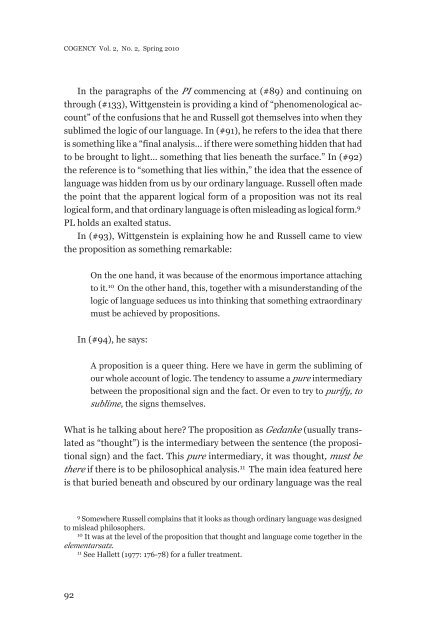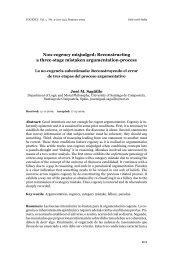Cogency v2 n2
Cogency v2 n2
Cogency v2 n2
Create successful ePaper yourself
Turn your PDF publications into a flip-book with our unique Google optimized e-Paper software.
COGENCY Vol. 2, N0. 2, Spring 2010<br />
In the paragraphs of the PI commencing at (#89) and continuing on<br />
through (#133), Wittgenstein is providing a kind of “phenomenological account”<br />
of the confusions that he and Russell got themselves into when they<br />
sublimed the logic of our language. In (#91), he refers to the idea that there<br />
is something like a “final analysis… if there were something hidden that had<br />
to be brought to light… something that lies beneath the surface.” In (#92)<br />
the reference is to “something that lies within,” the idea that the essence of<br />
language was hidden from us by our ordinary language. Russell often made<br />
the point that the apparent logical form of a proposition was not its real<br />
logical form, and that ordinary language is often misleading as logical form. 9<br />
PL holds an exalted status.<br />
In (#93), Wittgenstein is explaining how he and Russell came to view<br />
the proposition as something remarkable:<br />
On the one hand, it was because of the enormous importance attaching<br />
to it. 10 On the other hand, this, together with a misunderstanding of the<br />
logic of language seduces us into thinking that something extraordinary<br />
must be achieved by propositions.<br />
In (#94), he says:<br />
A proposition is a queer thing. Here we have in germ the subliming of<br />
our whole account of logic. The tendency to assume a pure intermediary<br />
between the propositional sign and the fact. Or even to try to purify, to<br />
sublime, the signs themselves.<br />
What is he talking about here? The proposition as Gedanke (usually translated<br />
as “thought”) is the intermediary between the sentence (the propositional<br />
sign) and the fact. This pure intermediary, it was thought, must be<br />
there if there is to be philosophical analysis. 11 The main idea featured here<br />
is that buried beneath and obscured by our ordinary language was the real<br />
9<br />
Somewhere Russell complains that it looks as though ordinary language was designed<br />
to mislead philosophers.<br />
10<br />
It was at the level of the proposition that thought and language come together in the<br />
elementarsatz.<br />
11<br />
See Hallett (1977: 176-78) for a fuller treatment.<br />
92








